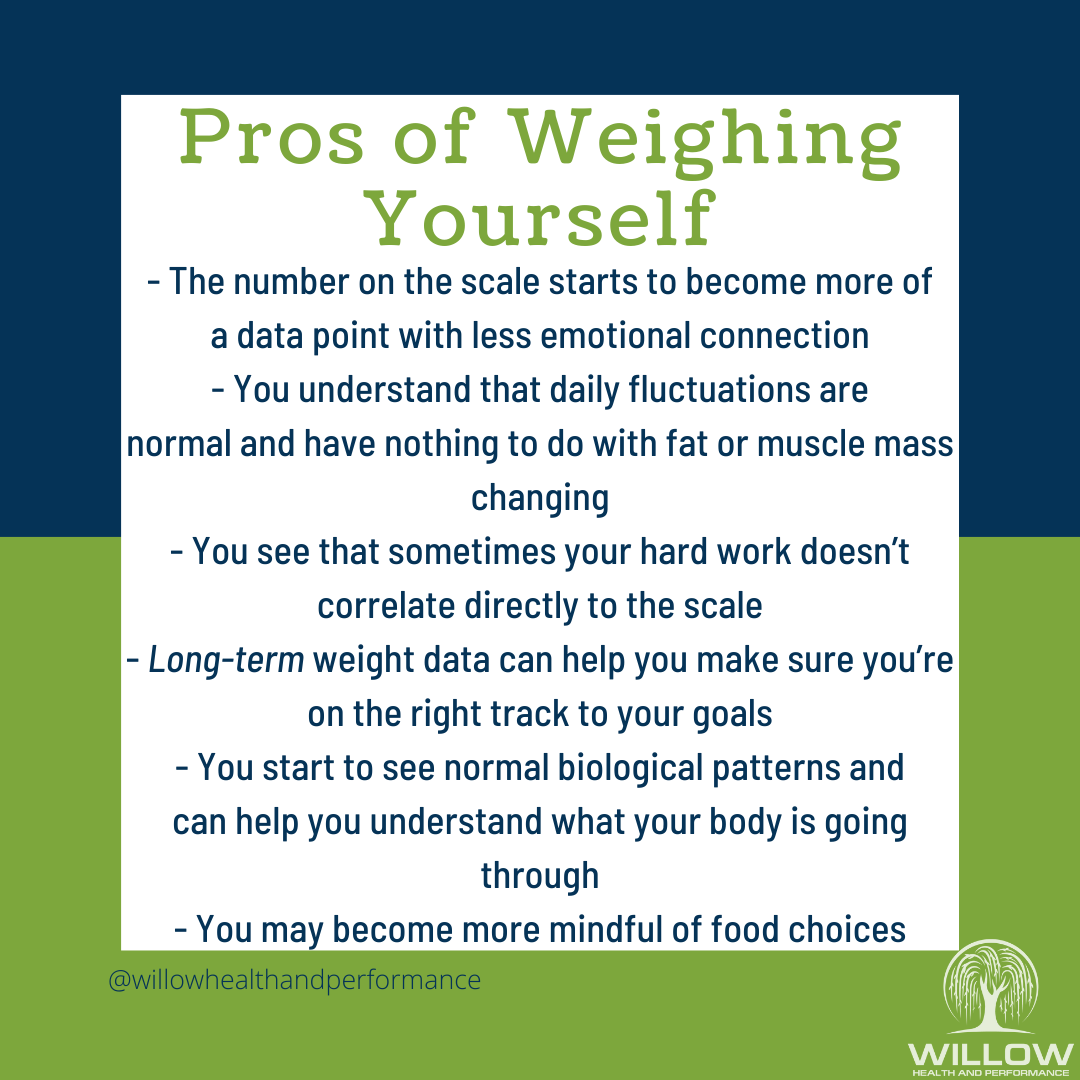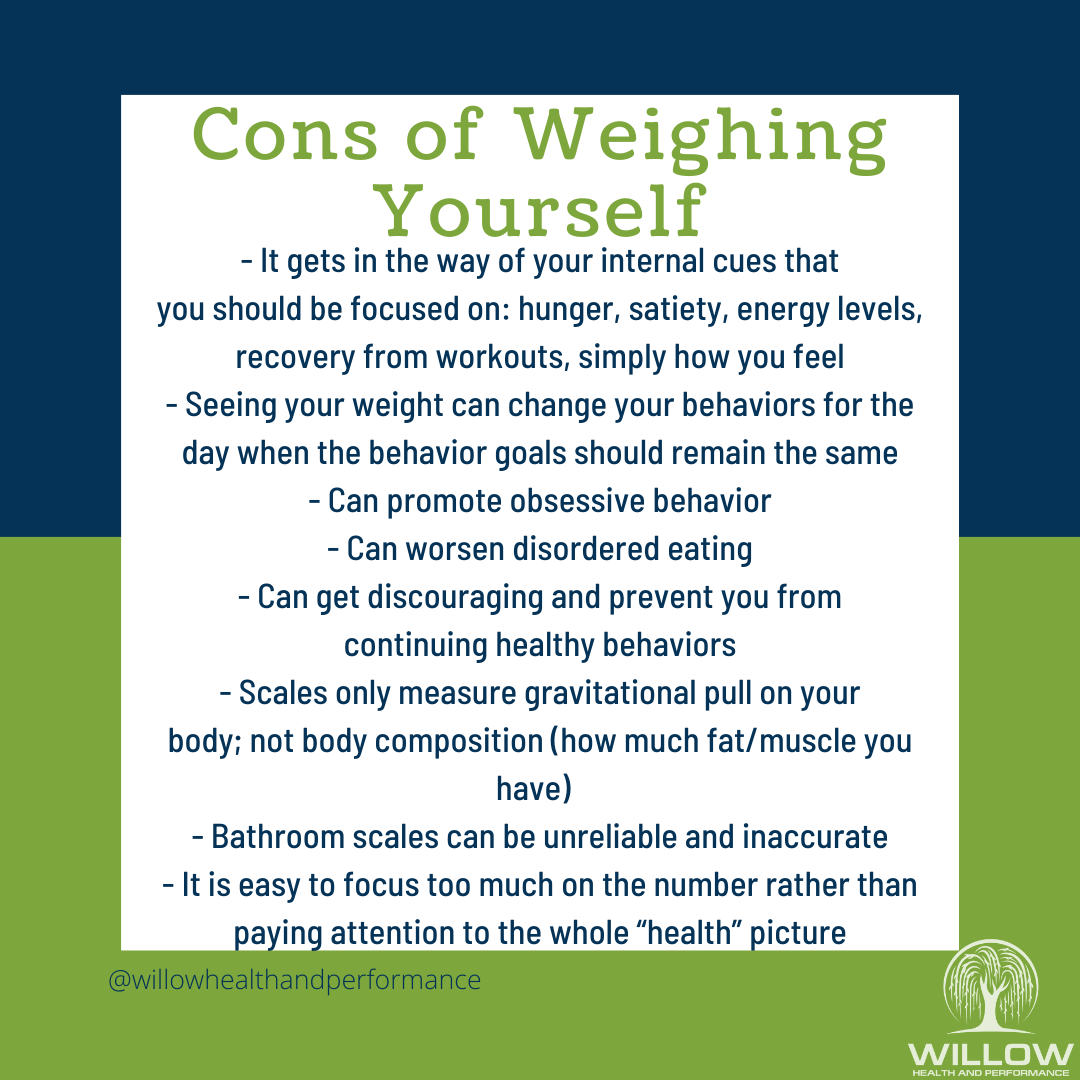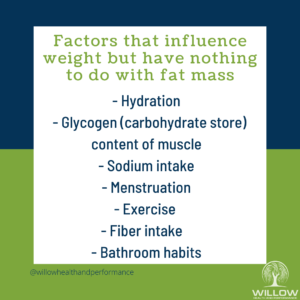How do you determine if you should weigh yourself or not? Let me start off by reminding you all that nutrition should be individualized and each person will answer this question differently. Many factors go into determining if you should weigh yourself. First, if you do not have a body composition goal (losing weight, gaining weight) you probably do not need to weigh yourself regularly. If your goal is fat loss or muscle gain, it might be beneficial to weigh yourself. If your goal is intuitive eating and you are new to it or struggling with it, you should not weigh yourself.


Pros to Weighing Yourself:
- The number on the scale starts to become more of a data point with less emotional connection
- You understand that daily fluctuations are normal and have nothing to do with fat or muscle mass changing
- You see that sometimes your hard work doesn’t correlate directly to the scale
- Long-term weight data can help you make sure you’re on the right track to your goals
- You start to see normal biological patterns and can help you understand what your body is going through
- You may become more mindful of food choices
Cons to Weighing Yourself:
- It gets in the way of your internal cues that you should be focused on: hunger, satiety, energy levels, recovery from workouts, simply how you feel. All of these things should go into helping you determine what/how much/when to eat
- Seeing your weight can change your goals for the day when it shouldn’t (your weight is up so you restrict intake more which leads to increased likelihood of binging or your weight is down so you eat more than is satisfying when you should just stick to the same goals no matter what the scale says day to day)
- Can promote obsessive behavior
- Can worsen disordered eating
- Can get discouraging and prevent you from continuing healthy behaviors
- Scales only measure gravitational pull on your body; not body composition (how much fat/muscle you have)
- Bathroom scales can be unreliable and inaccurate
- It is easy to focus too much on the number rather than paying attention to the whole “health” picture
Remember, the number on the scale is not the only thing to focus on or even most important thing. When trying to make a health change, focus mostly on the actual behaviors that are going to get you there, not the outcome measures like weight.
So, you decide to weigh yourself. How often should you weigh-in? If your goal is fat loss or muscle gain, I typically suggest weighing about 3 times per week. Again, this is individual. I may tell someone to never weigh himself or herself or I may suggest someone weigh-in every day of the week. Keep in mind that it’s more likely in my practice that I tell someone not to weigh himself or herself so don’t feel like you have to!
3 times a week is a good average to get enough data without it being overwhelming or getting in the way of those internal cues we care so much about. A couple key points though; write down your weights and make sure to recreate the same situation each weigh-in.
First, writing down your weights will allow you to look at trends over time rather than changes you see day to day. You could keep a notebook by the scale and write down the date and weight each time or keep a note in your phone. Average your weights weekly after your last weigh-in for the week. How these averages move overtime is the most important piece. You could also use a program to put your weights into a graph (MyFitnessPal does this) so it is easier to see trends.
Second, making sure you recreate the weigh-in situation each time will help keep the data reliable.
- Pick the same time of day, ideally in the morning after using the restroom and before eating or drinking.
- Put the same on the same exact spot each time.
- Weigh-in on the same days each week. Many of us tend to eat more over the weekend so something like Monday, Wednesday, and Friday morning might be good days to choose for weigh-ins.
Changes will happen slowly. That is okay! Fantastic fat loss progress is losing 1-2 pounds per week. That will be hard to see on the scale for the first month or so but do not let that discourage you. Keep up those healthy behaviors and the weight will follow.
Muscle gain is even slower! We are only looking to gain about 0.5-1 pound each week so be patient.
A good rule of thumb is the slower the process, the more sustainable and maintainable the changes will be. We are looking for long-term behavior changes; no quick fixes.
Factors that can influence your weight but have nothing to do with fat mass
- Hydration
- Glycogen (storage carbohydrate) content of muscle
- Sodium intake
- Menstruation
- Exercise
- Fiber intake
- Bathroom habits

Keep in mind that if seeing the number on the scale causes emotional stress or other negative feelings, it is okay to put the scale away for a while and you can even ask your doctor not to show you your weight during check-ups. However, it might be beneficial to work with a dietitian to help you understand your weight and health so the stress of seeing your weight is lessened over time.
Questions on how this applies specifically to you? Work me with me.

